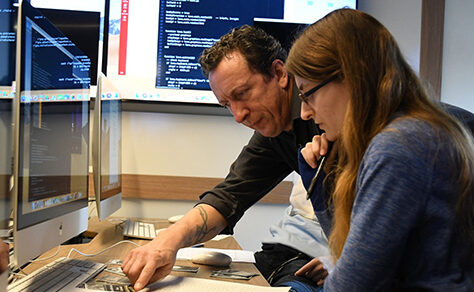Maintaining a career in the gaming industry takes a lot more than just a winning streak in “Fortnite” or “Overwatch.” It takes creativity, technical knowledge, and adaptability, among other skills. Think you’ve got what it takes to become a game designer? Then earning a degree in Game & Interactive Media Design may be for you.
*This article is sponsored by Rider University
Video games are the product of sophisticated software, transporting users into an alternate reality. They incorporate intriguing narratives, strong characters, and intricate challenges woven into a storyline for the user to overcome.
“My dream job is to be a lead writer for video games,” said Nichole Hall, a freshman studying Game & Interactive Media Design at Rider University.
Students earning a Bachelor of Arts in Game and Interactive Media Design at Rider explore their passion for video games. From Digital Filmmaking to Pop Songwriting, the program’s elective courses give students the freedom to customize their learning to reflect their career goals.
“The program is fairly holistic in approach, and covers a wide breadth of skill sets over a typical four-year process,” said William Lindsay, assistant professor at Rider University.
“The good news is that the skill set and games themselves are highly scalable and becoming a part of many other industries. Marketing, education and training applications abound in almost all industries — games fit in all of these places,” he added.
We asked Hall and Lindsay to share with us what it’s like to study game design, and in the process we assembled a list of 10 skills you need to become a video game designer.
1. Collaboration
The creation of a video game isn’t a solo project. It’s the product of brainstorming, drafting, revising, and most importantly, teamwork.
Designers need to know how to effectively work in a collaborative environment, and be conscious of how their work affects the team and project.
2. Time management
Prioritizing deadlines is essential to ensuring the project is completed in a timely manner.
“To be a videogame designer, you have to be ready to do your share of the work quickly and entirely. Failing to do your part affects everyone negatively. This is where time management is especially important,” said Hall.
3. Critical thinking
Designing a video game involves planning and strategizing, as players are expecting to find tasks and obstacles built into the game. Future designers like Hall need to analyze information and arrive at a reasonable solution.
“I’ve learned through this program that you need to approach even a simple game concept with a critical thinking mindset,” she said.
4. Effective communication
Whether you’re an animator or a marketing representative, the ability to successfully communicate messages to your audience is essential for success. Video games are considered a form of mass media, as they reach a wide range of audiences. Rider’s program includes coursework studying Communication, Culture and Media and Communication Ethics to ensure students develop effective communication skills.
5. Creativity
It’s no surprise that video game designers usually have an active imagination and a creative mindset. They’re responsible for producing top-quality challenges for users to overcome, which may include solving puzzles, exploring virtual realities, and creating new immersive worlds in which users will play.
6. Storytelling ability
From character development to producing compelling plot lines, video game designers need to incorporate elements such as humor, suspense, and conflict to capture the player’s attention. This can be done in a variety of ways, from writing jokes, to composing music, to drawing animations.
“I chose the Game & Interactive Media Design program at Rider because it gave me the option to choose a concentration in either music, narrative, or visual design. Programming doesn’t interest me, but writing does, so being able to concentrate in narrative design highly appealed to me,” said Hall.
7. Knowledge of multimedia development software
When asked if she had advice for prospective students, Hall replied, “Get familiar with Photoshop, you’ll be using it a lot.”
Players tend to judge the quality of a game based on the graphics and animation. Software applications, including Adobe Creative Suite and Toon Boom Harmony, help designers improve the quality of their work. Look for courses like 3D Graphic Animation or Digital Mixing and Mastering to help teach you the multimedia skills needed for the job.
8. Programming knowledge
You may not need to become an expert in this area depending on your career path, but game designers need foundational knowledge of algorithms, data structures, and basic coding terminology. Designers must also be conscious of the modality in which the player will be viewing the game. Animation will render differently on a television screen than on a cell phone.
9. Adaptability
Nervous about your artistic or technical ability? Don’t be. The skills acquired through a Game & Interactive Media Design major can be easily transferred across industries.
“The game industry is not simply the domain of artists and programmers. Psychology, communications and writing, music, business, history, the sciences and many other areas of study all come into play in this industry. Being nervous about drawing skills or programming does not preclude you from a very successful career in the industry,” said Lindsay.
10. Persistence
Often categorized as a soft skill, video game designers may need to rely on persistence to help get their careers off the ground.
“Game design is a tiring, intense job, but also one that is very fulfilling. You have to have the energy and passion to be a game designer, because if you don’t, you’ll find the work draining,” said Hall.
Think you’re interested in a degree in Game & Interactive Media Design? Use our free College Search Tool to explore programs and schools near you.



